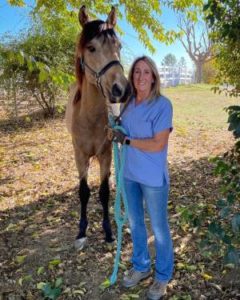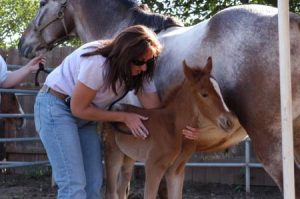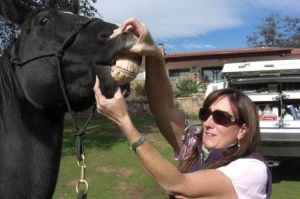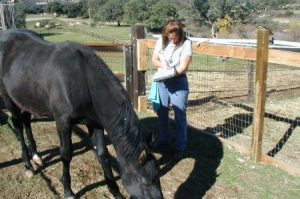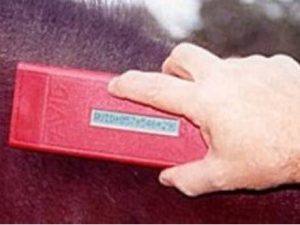It's quite easy to recognize the symptoms of tying up. The horse may halt suddenly and balk when urged to continue forward. When forced to continue working, gaits become extremely short and stiff. In response to stress and pain the horse may begin to sweat profusely. Within a few moments, the horse is nearly immobile: the muscles of his hindquarters, in particular, appear fixed and rigid.
Simply put, tying up is a metabolic syndrome where muscle spasms overwhelm a horse, rendering them unable to walk in the worst cases. It begins during exercise, typically within the first 10 to 20 minutes. Though the horse may initially feel fine at the walk, an interval of brisk trotting or cantering can prompt the onslaught of symptoms. In the past, tying up syndrome was euphemistically known as Monday Morning Sickness. That's because hard-working horses kept on their regular grain ration on Sunday, when they were resting, would exhibit symptoms of tying up when they went back to work on Monday. In these cases, tying up was the result of too much glycogen (sugar) being loaded into the horse's system. A sudden return to work did not allow the horse's body enough time to metabolize the overload of glycogen and muscle spasms resulted.
An occasional bout of tying up is not a cause for alarm, although it is a veterinary emergency. The affected horse should not be moved, as it can cause muscle tissue damage. Leave the horse in the arena or out on the trail until help arrives. If that's not possible, very, very slowly lead the horse at a slow walk to the nearest place where there is access to veterinary care. A horse that has tied up is typically administered medications to help alleviate the spasms, quell any signs of stress and ease pain. Blood can be drawn to look for signs of muscle tissue damage.
To prevent a recurrence of tying up syndrome, most horses will be placed on a diet that restricts the amount of grain and molasses-based feeds. That reduces the amount of glycogen that must be metabolized. They are also kept fit rather than being allowed to sit in a corral for days at a time only to be pulled out, tacked up, and taken on a marathon trail ride.
Horses that repeatedly tie up may have inherited a disease called polysaccharide storage myopathy, or PSSM. These horses are hyper-sensitive to the insulin that's produced by consuming carbohydrates and starches, which raise blood sugar levels. Currently, it's not known how many horses actually have PSSM, although it's believed to be most prevalent in stock horse breeds such as American Quarter horses and Paints.
A muscle biopsy can confirm if a horse has PSSM. However, the treatment for PSSM is relatively easy to follow. Many PSSM horses can remain asymptomatic if they are exercised regularly, kept fit, and fed a diet low in carbohydrates and sugar. Fat replaces carbohydrates as the energy source. This can be achieved by adding rice bran and vegetable oil to the horse's diet. Many veterinarians also recommend adding a Vitamin E supplement (and perhaps selenium) to the horse's daily rations. Of course, this means eliminating virtually every type of commercially made treat, as well as grain and molasses-based sweet feeds and pellets. But with some vigilance a horse prone to tying up can lead a full, rewarding life.

